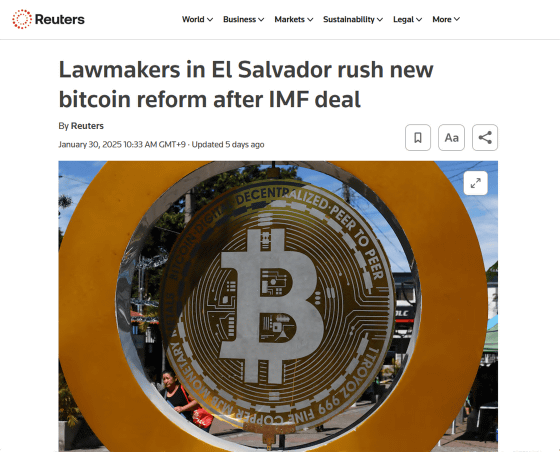El Salvador finally removes Bitcoin as legal tender to receive IMF loan

Lawmakers in El Salvador rush new bitcoin reform after IMF deal | Reuters
https://www.reuters.com/world/americas/lawmakers-el-salvador-rush-new-bitcoin-reform-after-imf-deal-2025-01-30/

El Salvador Abandons Bitcoin as Legal Tender After Failed Experiment
https://ticotimes.net/2025/02/02/el-salvador-abandons-bitcoin-as-legal-tender-after-failed-experiment
El Salvador has been attracting attention for its dramatic improvement in public safety through bold, almost dictatorial policies under President Najib Bukele , who took office in 2019. President Bukele is also a strong advocate of Bitcoin, and in September 2021, the country became the first in the world to enact a law making Bitcoin legal tender.
El Salvador becomes the first country in the world to make Bitcoin legal tender - GIGAZINE

However, the International Monetary Fund (IMF) , which aims to stabilize international finance , has called for Bitcoin to be removed as legal tender, and it has also been reported that Bitcoin has not yet become widespread among the Salvadoran people.
In El Salvador, where Bitcoin became the first legal currency in the world, it is pointed out that 'Bitcoin is not widely used' - GIGAZINE

What has significantly changed El Salvador's Bitcoin policy is the $1.4 billion (approximately 220 billion yen) loan agreement concluded with the IMF in December 2024. Since it was necessary to comply with the agreement with the IMF in order to realize the loan agreement, the Salvadoran Congress passed a legal amendment on January 29, 2025, 'lifting the obligation to accept transactions and debt payments in Bitcoin.'
Although the law still states that Bitcoin is legal tender, Carlos Acevedo, former president of the Central Bank of El Salvador, has stated, 'If someone owes you money and wants to pay you in Bitcoin, you can refuse to accept it. If Bitcoin were truly legal tender, you wouldn't be able to refuse to accept it.' As such, this legal change essentially removes Bitcoin from its status as legal tender, as it removes the obligation to accept payments, which is an important condition for it to be legal tender.
President Bukele has tried to promote Bitcoin in El Salvador, but a 2024 survey by the Central American University revealed that 92% of Salvadorans do not use Bitcoin for transactions. Juana Enriquez, a 55-year-old nurse living in El Salvador, commented, 'I used Bitcoin, but I didn't like it because it's very complicated and risky. It's not suitable for employees who are barely surviving on a salary.'
Under the revised law, the US dollar will be the only legal tender in El Salvador, and it will be up to the private sector to decide whether to accept the use of Bitcoin. Economist Rafael Lemus said, 'Bitcoin no longer has legal tender status. The original intention was to make Bitcoin legal tender, but the government tried to force it, but it didn't work.'

El Salvador's ambassador to the United States, Milena Mayorga, argued at an event on January 30 that the legal changes should be seen as an 'adaptation to the situation.' 'President Bukele keeps buying bitcoin. We have a bitcoin office, we have a bitcoin law, and bitcoin can be used in El Salvador,' Mayorga said.
According to the Salvadoran National Bitcoin Office, the country holds 6,050 BTC, equivalent to approximately 95 billion yen in Japanese yen.
Related Posts:
in Note, Posted by log1h_ik






